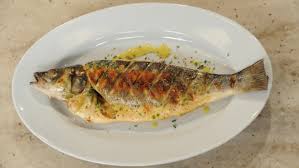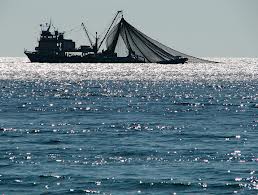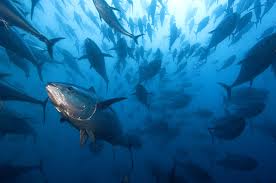I’m sitting at a nice outdoor restaurant in Galilee. Tired of ordering the old favorites: grilled chicken, hummus, salads, I ask the waiter “What’s your Catch of the Day?” The waiter excuses himself only to return a moment later with his manager. The manager leans forward and explains the options available. There’s salt-water fish from man-made fisheries; there’s fish from man-made fresh-water pools and there’s “fresh” fish flown in.
I look up the waiter. The Land of Israel is known for miracles, but flying fish is a bit much. So I ask. Turns out, Israel has exhausted most of its fish along the coastline. Fresh fish are pulled out of the Mediterranean near Cyprus and Greece; they’re packed in ice, delivered to an airplane, and 24 hours later, the Greek-speaking fish is on my plate.
I squeeze lemon juice on the grilled fish I ordered and remind myself to find out why I can’t have an “Israeli” fish. The short answer is that there is no short answer.
The Mediterranean is dying. Look at the map and you realize it’s an enclosed body of water. The narrow Straits of Gibraltar in the south of Spain is the only outlet into the Atlantic. As a teenager I sailed on a passenger ship from New York to Israel, through the Mediterranean. The ship sailed along the coast of North Africa. From the upper deck my sister and I could spot hundreds of dolphins escorting the ship, jumping in and out of the water playfully.
That was then. 1971.
In the last 15 years alone the amount of fish along Israel’s coast has dropped by almost half. Blame it on many factors. Unlike other countries that ban fishermen from fishing during the breeding season (4 months), Israel’s fishing policy allows fishermen to fish year-round. This means that tiny fish are caught up in nets; they don’t have a chance to mature and are thrown away. Over time, this leads to fewer and fewer fish in the sea.
Trolling is the next bad boy. You’ve seen documentaries on how big fishing vessels lower giant nets to the bottom of the sea. The boats suck up everything in sight; they tear up rocks, coral and reefs. They destroy all in their path. Many of the fish caught are not commercial grade; they’re part of the food chain, but they’re killed in the process.
The Japanese, and their insatiable appetite for bluefin tuna, have signed lucrative fishing contracts with Mediterranean countries. They catch boatloads of tuna, often illegally, and ship them to Tokyo. Sony or Honda executives might step out to lunch with their buddies and not know or care that their sushi has emptied the Mediterranean.
And let’s not forget the Egyptians. Strongman Gamal Abdel Nasser wanted to go down in history like an Egyptian Pharoah. So he built the massive Aswan Dam on the River Nile with the help of the Soviets in the 1960s. The Dam was a great success. The Nile no longer flooded. Water irrigated the fields regularly and evenly. The dam generated electricity for the Egyptian masses.
But damn it, the dam is killing the Mediterranean. Sediments and silt that flow from the highlands of Ethiopia and down to the Nile Delta never make it to sea. The stuff gets trapped behind the dam’s concrete walls. The fish, dependent on the sediments as food, sink to the bottom, starving.
We’re not done with Egypt. The Suez Canal, completed in 1869, is an engineering marvel. Ships from the Far East and India no longer had to sail around the African continent to get to Europe. They went through the Suez Canal – the ultimate short cut.
But the short cut led to long-term damage. Fish from the warmer Indian Ocean, with spicy hot curry in their tails, started to swim north. They swam through the Red Sea, through the Suez Canal and into the Mediterranean.
War. The Indian fish are predatory; they killed the mild, let’s-have-fun Mediterranean fish.
Before long, the Indians took over the waters without paying rent.
And they brought with them a whole bunch of illegal immigrants: millions of jelly fish.
Jelly fish gravitate to warm waters. Yearly, they clog up electrical power plants along Israel’s coast. They come near unsuspecting swimmers and release their venom. The sting burns like hell. And when they’re done with humans, they go after fish eggs, further lowering their numbers.
It seems fish in the Mediterranean can’t catch a break. Worse, everybody wants to catch them.
I’m done with my dinner. The waiter comes to my table again, looks at the fish bones on my plate. He asks, “Do you want desert?”
‘Yes,” I say, thinking my Greek fish should have a companion. “How about a glass of ouzo?”
———————————————————————————————————————————————-
Maurice Labi is an Israeli-American who lived in Los Angeles for many years. In 2011 He returned to Northern Israel (Galilee) with his wife and twin teenage daughters. He is of two lands, of two cultures and he blogs about his experiences in Israel, particularly from Galilee where Jews and Arabs dwelled for centuries.
He has also written three novels: “Jupiter’s Stone,” “Into the Night,” and “American Moth” — available at Amazon.com
http://www.amazon.com/s/ref=nb_sb_noss?url=search-alias%3Dstripbooks&field-keywords=mauricelabi
or at BN.com
http://www.barnesandnoble.com/s/maurice-labi?store=allproducts&keyword=maurice+labi



